Fog of Love
Publisher: Hush Hush Projects
Format: Board Game
Number of Players: Two
Price: $49.97
Copy purchased by reviewer
In this review, Adam dives into Walmart’s new exclusive release: Fog of Love. Just in time for Valentine’s Day!
There are precious few games in my collection that are about the experience and the story players tell together instead of who accumulates the most victory points. I cherish each of these games in which players are brought together to simply enjoy wherever the road takes them. Tales of the Arabian Nights is one such game I’ve written about; it’s my go-to when friends and family want something a little more chill in between heavier games. Though I will say of Tales that sometimes I wish there was a little more “game” mixed in with its storytelling.
Thank goodness then for Fog of Love, designed by Jacob Jaskov and published by Hush Hush Projects. This was a game literally designed by a guy who owned hundreds of board games that his wife would not play with him. She enjoyed romantic movies, though, and so he made a game that he believed his wife and he could enjoy playing together. And now we can all enjoy it too!
Editor’s note: This is a bit of an “adult” game. Not that it’s graphic in any respect, but some of the subject material is definitely designed for an 18+ age crowd. Players younger than their mid-20s-ish might even find it dull.
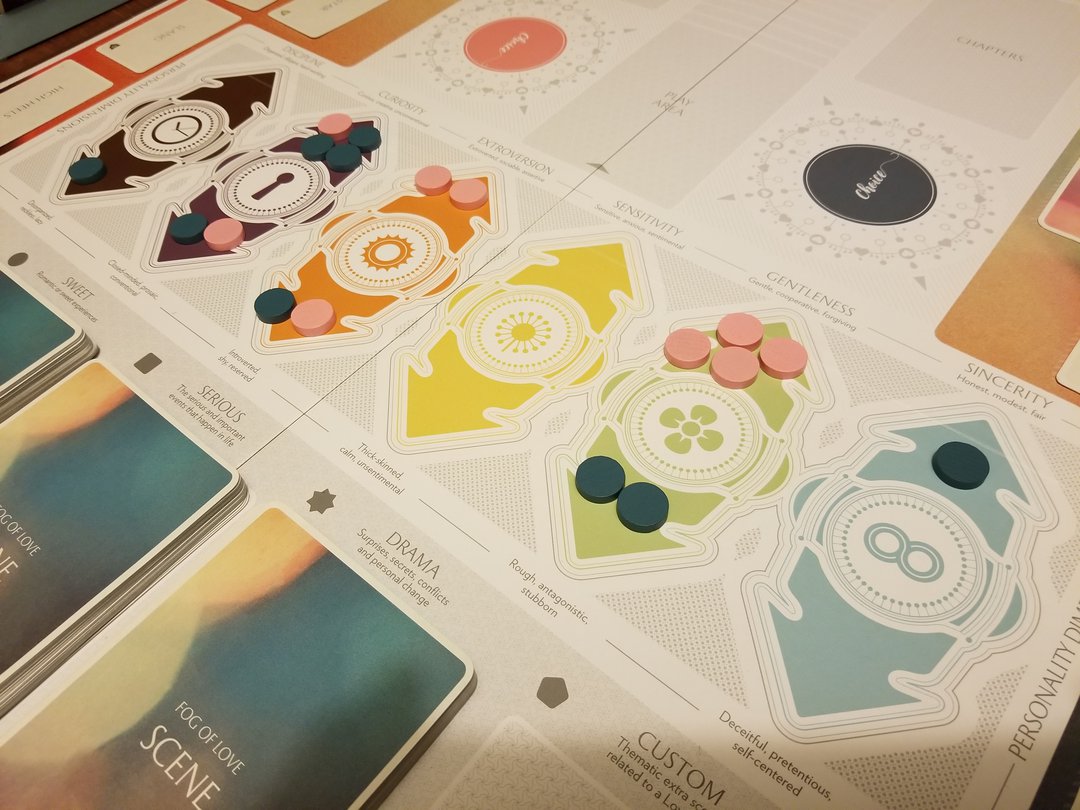
The board itself has such a clean, stylish look. Don't tell it I said this, but I find it rather attractive.
The Shape Of Love
There is a game in Fog of Love, which I would classify as social deduction for two players. Going into a game, you and your partner will have certain wants and needs in order to “be happy,” measured of course in happiness points! Unlike victory points found in many other games, however, these don’t determine your ending score. Rather, they help determine if you meet your “destiny.” Here I am talking about happiness and destinies, getting ahead of myself, though. Let me take a step backwards a moment to put this all into context for you.
As part of game setup, you and your partner will start with three hidden traits. These could be things like being insecure, being adventurous, or being lazy. These traits, if you can fulfill the conditions on them, will award you with bonus happiness during the game’s ending tally; we’ll get to why we need that happiness in just a moment. These qualities match up to six different personality traits on the main board, based on actual scientific research: Discipline, Curiosity, Extroversion, Sensitivity, Gentleness, and Sincerity. To get your end-game bonus, you might need to have a personal negative score in Discipline (the lazy lifestyle), or you and your partner might need a combined positive score in Sensitivity (an honest relationship).
As you rack up points, either positive or negative in these categories, you’ll hopefully bring yourself, and maybe your partner, closer to that bonus happiness that will win you both the game. You see, a game is won by a player if they can fulfill the objective on their chosen destiny card. You start the game with several but are forced to discard down as the game progresses, narrowing your choice of paths to victory. Maybe you want to be equal partners with the other player (happiness is within a similar level to theirs), or maybe you’ll just be happy if you’re controlling everything (your happiness has to be significantly higher than the other player). It’s very possible that one player can win while the other does not. Think for a moment on what that might signal in a relationship.
If you can deduce your opponent’s needs, if you choose to match them or play selfishly, and how your relationship resolves are all up for grabs. How your story ends will all depend on how you play.
Also, before we dive into the deep end here, I just want to give a bonus setup shout out to the fact that either the pink or blue side of the board can be played as male or female, allowing you to swap the traditional gender color assignments or even play in a male/male or female/female relationship if you so desire.
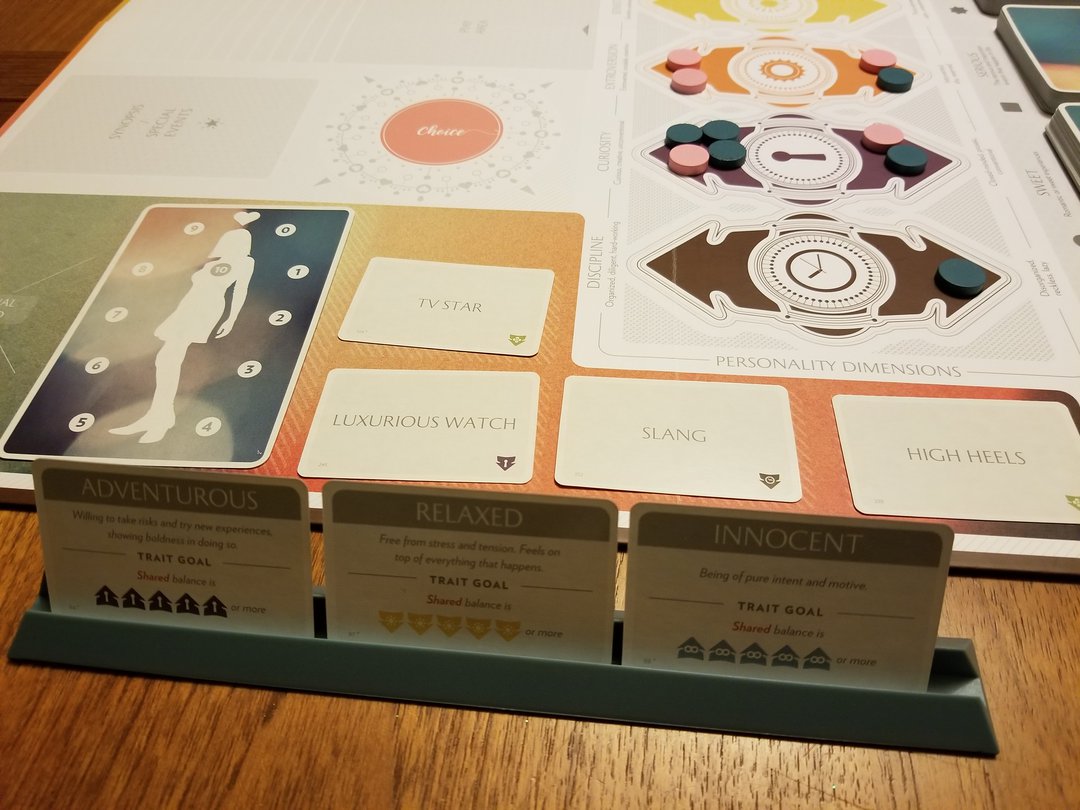
You dress one way, but your personality is so much more easygoing. Putting up a front for your job perhaps?
Setting The Scene
Each game of Fog of Love is framed by a scenario, of which there are four in the base box (and expansions to come in 2018). It all sets up similarly to a game of T.I.M.E Stories in that the board is something of a console that you plug everything into. There will be chapters you play through, offering you bonus happiness at “checkpoints” in the relationship, indicating if special cards should be mixed into the setup (like a proposal and a wedding in scenario #2), how many destiny card you must discard, and the “scene” card piles from which you must replenish your hand. They range from “sweet” ones, offering very small penalties for mismatches, to “drama” in which you find exciting cards like “By the way, I’m married.”
And those scene cards are the meat of the game. They offer glimpses into key moments in the relationship. Fancy weighted poken chips labelled “A” through “D” are tossed face-down by players as they select their outcomes, often rewarding similar choices when flipped. Do you and your partner both find the same quote romantic? There’s a nice little happiness bonus for you! Some cards, however, end badly if players mix certain reactions. For example, you can imagine how things blow up when an “Argument at the restaurant” ends in both players choosing, “You know I’m right!”
In addition to happiness bonuses, scene cards allow you to move up or down on the personality tracks, ensuring you’re meeting your character’s needs, but they also allow you a means to deduce your partner’s personality. You’re encouraged to roleplay the part of your character rather than yourself, and the game mechanics offer a nice pull in this direction. Sure, I’m personally an organized and honest person, but maybe my character is a lazy jerk who just wants happiness at the cost of his significant other. As I play into the scenes, putting tokens where I want them (negative on the Discipline and Gentleness tracks), I’m giving my partner hints as to the nature of my hidden trait cards. If we can play together and find a way to make it work, if only one of us will end up happy, or if the relationship will crumble are all on the line.
What destiny card is your partner working towards, by the way?
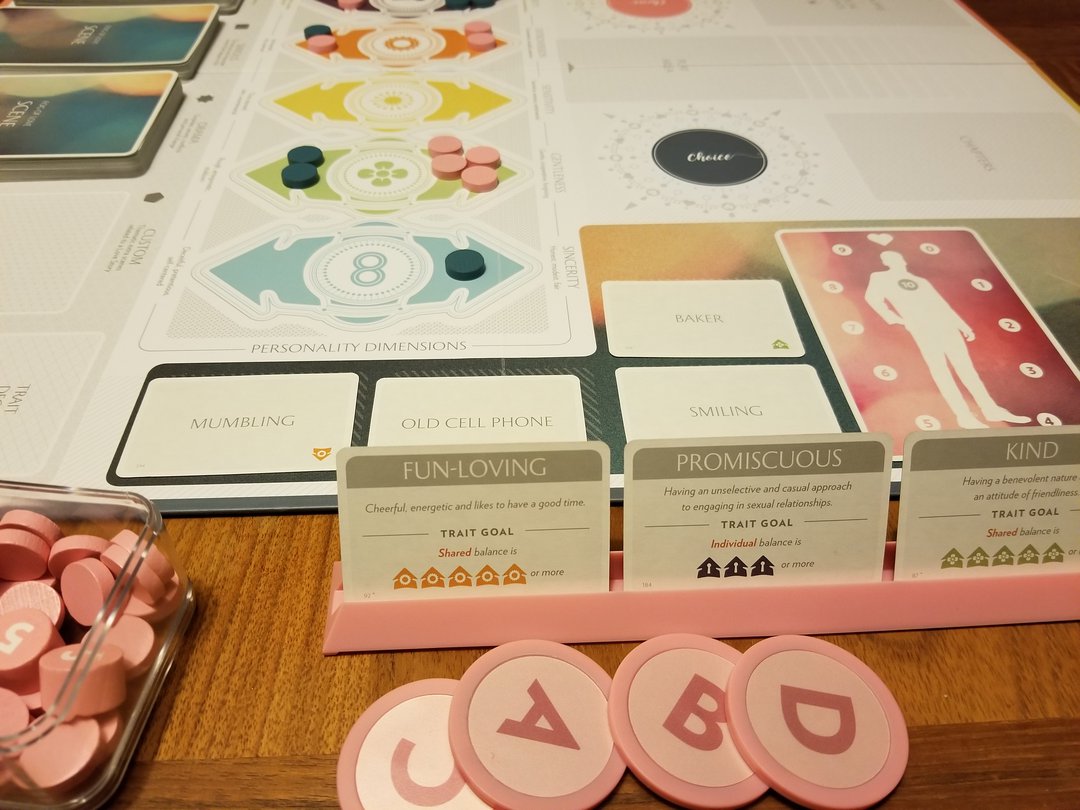
I wonder if his freewheeling spirit will be a dealbreaker.
Beauty Is In The Eye Of The Beholder
Of course, this game would only be so good if you were locked into your cards with no ability to have your character grow as a person. What kind of relationship game would that be? Certain scenes allow you the ability to change things, for better or worse! Your destiny is literally in your own hands. A particular domineering choice might force you to swap the matching destiny card back into your hand if you’ve previous ditched it. You didn’t pick it up from your discard? That’s a huge signal to me that you were still holding it and the potential endgame options you’re shooting for. Similarly, some scenes may offer the opportunity for me to swap off an incompatible trait (or force you to swap one of yours), though keep in mind that while we might be better aligned for our destinies now, our scoring condition for that bonus endgame happiness is shifting midgame. Do we have enough time left to achieve a new personal goal?
Much like an actual, budding relationship, the beauty of this game is in the reveal. Your early scene cards will likely be a bumble of choices and mismatches as both players feel out the leanings of their partner. The game, to its credit, rewards strategic play here. Perhaps you play some of your “sweet” cards, relatively free of penalties, to get a sense of the character opposite you. Late in the game, though, you won’t be able to draw more of those, so maybe you save them and choose to play a “serious” or “drama” card to feel things out. You have time to minimize the fallout over the course of the rest of the game, right? And sure you’re playing selfishly right now, but as you become more fluent in the systems you’ll start to see synergies; you might be able to achieve a conflicting personal goal if a trait has a shared score, if you can just get your partner on board to balance that stat you’re pulling in the wrong direction.
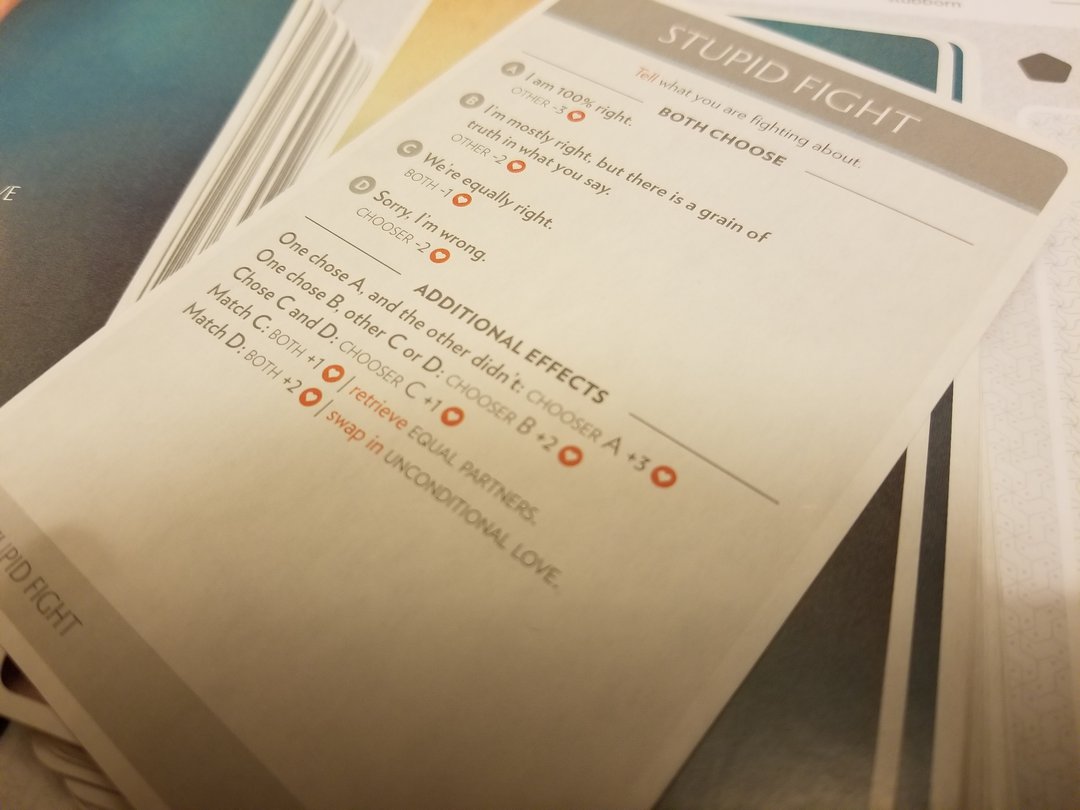
We've all had at least one of these.
The Culmination Of Rikki And Reese
Rikki was a frumpily dressed, not-very-socially adept student in journalism. She’d been longtime high school sweethearts with Reese, a sharp-dressed royal heiress (the game’s occupation card, I can’t make this stuff up) and a bit of a “mean girl.” As the two of them grew into adulthood, would their relationship last? That was the question of one of my first games of Fog of Love.
I was struck by how easy it was to initially play Reese. I had some deep-rooted insecurities that remained hidden behind my trait cards, belying the story of an accomplished, slightly insensitive, stuck up young woman who was secretly dealing with her own inner struggles. Opposite me, my friend playing Rikki unaware of my character’s inner turmoil, selected his more open and adventurous outcomes in our scenes. I played selfishly, playing up my own traits for happiness. It was difficult at first to conceptualize game strategy and mechanics, as streamlined as the systems were, still hiding behind all the symbology. But if I followed my own traits’ leanings, I’d be ok, right?
As the game progressed, it became clear that Rikki and Reese would have a difficult time coalescing on concurrent destinies. Hard choices, beyond simple answers within the scenes loomed. Quietly, I shifted the destinies in my hand I would keep and which I would discard. I cycled one of Reese’s more insensitive traits away for something more caring, the mean girl learning to care more sincerely for her longtime partner. All the while Rikki trying to keep up with Reese’s accomplishments and happiness.
The two grew closer, mending their somewhat broken relationship. We found the engagement card, a special event for the scenario, and agreed to get married. Happiness spiked for both our characters. And yet, as the two matured into adulthood, it became clear that of the two Reese was the only one truly fulfilled. By game’s end, my friend revealed Rikki’s destiny as “equal partners,” knowing it was impossible that our happiness scores would end that closely tied. I, on the other hand, played “self-actualization” for Reese and succeeded in meeting its conditions.
For us, this is how the story ended. Reese, the royal heiress, learning to shed her mean spirited insecurities and growing into a self-actualized young woman, while her partner, Rikki, always trailing in a vain attempt to keep up with the accomplishments of her significant other, sank away knowing she would never manage to be an equal partner in the relationship.
I’d imagine the engagement was broken off soon after the end of the game. Sometimes, this is the story that Fog of Love tells.
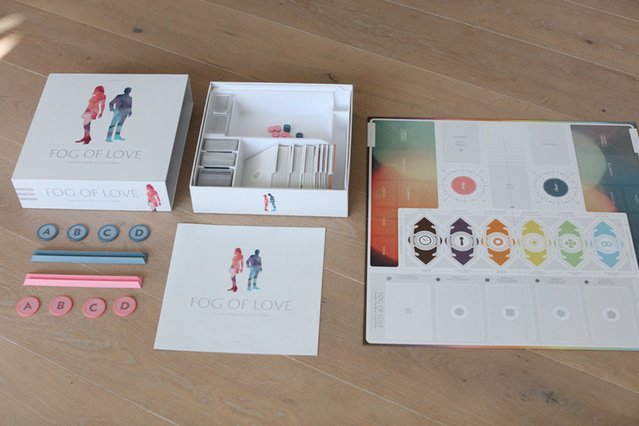
Also, the components are not only lovely but totally top notch quality! The gamer in me drools over stuff like this.
Meeting Mr. Right
Who is this game for? I’ve seen it both praised and shunned by roleplaying friends in my gaming group. I would say if you are accepting of my Rikki and Reese story and like the idea of a movie-like drama unfolding - whether you win or lose - you will enjoy this game. If you enjoy Tales of the Arabian Nights but wish there was more strategy and agency to the tales, this game is for you. If you like social deduction, roleplaying, and especially if you’re a fan of romantic flicks, this game is definitely for you.
If you’re looking for a deep social deduction experience akin to heavier titles in the genre, you won’t find that here, but that’s not really the point of this game. It’s a joy to watch to characters grow and change together or remain true to themselves in whatever context that takes. It’s a joy to create a story with another player, something we talk about quite a bit here at Sprites and Dice. There is a fair bit of replayability in the box as you create completely new characters and play with new people; and with expansions on the way there are other fun scenarios we can enjoy plugging into this engine with friends.
Sound like a game that might hit a chord with you? I recommend you take the plunge.
Life’s a journey. Enjoy the ride!